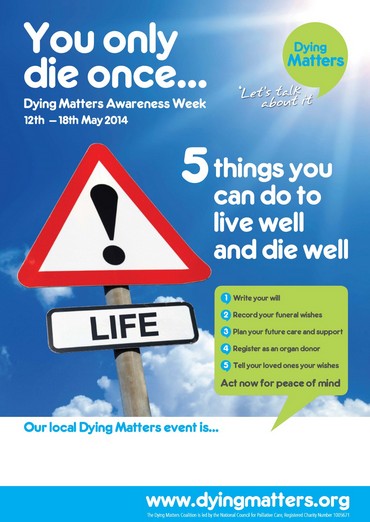“Our ultimate goal, after all, is not a good death but a good life to the very end.”
― Atul Gawande, Being Mortal: Medicine and What Matters in the End
This quote sums up for me a key part of what I feel my job is. As both a family doctor and the local NHS End of Life clinical lead, my role is to ensure that local health services are enabled to provide quality care and support for people reaching the end of their lives. We all would wish a good death for ourselves and our loved ones in as peaceful and in a planned way; so they maintain as much autonomy, dignity and compassion as possible.
 However, something has gone badly wrong with how we do things in modern medicine. Our goal has often seemed to be to try to prolong life no matter what the cost. And the cost is great. For the person, it may mean being subjected to a series of treatments which may cause harm, whilst distracting everyone concerned from the business of accepting the inevitable and living life to the full until death. For the family it may mean a more complicated bereavement, with words unsaid, actions not done. For the public services and NHS it means increased likelihood of repeated admissions and expensive and futile treatments. Who has not known someone who has been subjected to chemotherapy (which is after all, a poison) right up until their last week of life? Active treatments can prevent embarking with palliative and end of life care but there is no reason why these can’t run in tandem. Children’s end of life care services have been championing this approach for many years but adults healthcare hasn’t embedded the same approach.
However, something has gone badly wrong with how we do things in modern medicine. Our goal has often seemed to be to try to prolong life no matter what the cost. And the cost is great. For the person, it may mean being subjected to a series of treatments which may cause harm, whilst distracting everyone concerned from the business of accepting the inevitable and living life to the full until death. For the family it may mean a more complicated bereavement, with words unsaid, actions not done. For the public services and NHS it means increased likelihood of repeated admissions and expensive and futile treatments. Who has not known someone who has been subjected to chemotherapy (which is after all, a poison) right up until their last week of life? Active treatments can prevent embarking with palliative and end of life care but there is no reason why these can’t run in tandem. Children’s end of life care services have been championing this approach for many years but adults healthcare hasn’t embedded the same approach.
“Death is the enemy. But the enemy has superior forces. Eventually, it wins. And in a war that you cannot win, you don’t want a general who fights to the point of total annihilation. You don’t want Custer. You want Robert E. Lee, someone who knows how to fight for territory that can be won and how to surrender it when it can’t, someone who understands that the damage is greatest if all you do is battle to the bitter end.”
― Atul Gawande, Being Mortal: Medicine and What Matters in the End
So, as a person coming to the end of life, as a member of that person’s family, as their doctor, what is the territory that can be won, what should be fought for and what should be acknowledged as inevitable and prepared for? Planning ahead is everything. Without this we are victims to circumstance, without any control.

Westernised societies appear to have somewhat lost the plot when it comes to the end of life. We have sought to try to extend it no matter what the cost, and the cost is considerable: people dying on a trolley in a busy A&E department, in an Ambulance whilst having futile resuscitation attempts when death took place some time earlier, family members unable to say their goodbyes because the dying process was not recognised or acknowledged, an unnecessarily long or complicated bereavement experience. In my own family, because we did not want to own up to the fact that my father was dying, we missed vital opportunities to talk about some vitally important matters, something I will always regret.
So why have we been so poor at this in the last 50 years? I would list the following reasons which are by no means the only ones:
- We are less connected to rhythms of life generally, and creation.
- New technologies have blurred the boundaries of starts and ends of life.
- Medicine is part science, part art. We are less good at the art bit and, lets face it, doctors and nurses are human and many are uncomfortable addressing this sort of issue despite the fact that it should be bread and butter to all of us.
- Many people fear death or the process of dying.
- It is a deep, emotional subject and requires great sensitivity to address.
- Families find it more difficult generally to let go of their loved ones than the person who is dying and may attempt to prevent wholehearted preparation for death.
- People leave these conversations far too late and may have lost capacity to do so: either because of a sudden severe event or because dementia sets in (this is soon to become the most common cause of death).
- Increasingly it is difficult for the NHS and social care to provide the type of support that people need, when families are stretched and public resources increasingly scarce. It may be in the ‘too hard’ box. This ends up costing more in £s and in distress when folk end up being admitted to hospital as an ’emergency’ to die instead of peacefully making their exit in a dignified and peaceful way at home (where most people would prefer to be).

Asking the honest question?
We should consider asking this question of our relatives, of each other:
‘If I told you that you had just 3 months of useful life left to you, followed by death, how would you spend those 3 months?’
Ok, its a purely hypothetical question, but it does cut to the chase. What are the most important things to us? Are we currently spending our time most fruitfully now, living life to the full? Have we put in place all we would wish for our loved ones should we die unexpectedly? Have we said the things we want them to hear? Or, have we put all those things on hold for some future date that may never arrive?
There will be a whole week of focus on these issues, with people available to guide folk on the business of planning for the end of life so that they can then go on to live life to the full, confident that should something unexpected happen, wishes are known and plans in place.

What are we doing?
- Primary Schools art/poetry competition
- Death cafe: discussion, sharing, information about services, resources.
- Drop in sessions: will writing, legal services e.g. power of attorney, funeral directors.
- GP surgery resource packs
- Opportunity to find out about the new Respect Process emergency care plan documentation.
- Meaningful bucket lists!
- Sharing important information with relevant organisations ‘Know About Me’.

It is not well known by the public that those who opt for palliative care (aiming to actively manage symptoms and provide symptoms control rather than cure) actually live longer. Patients with terminal cancer taking this approach with or without chemotherapy had much better quality of life, live longer and were more likely to have their wishes met. Everybody who needs palliative care towards the end of life (most people actually) should receive it but only a small % actually do. The Hospice movement has grown to fill much of the unmet need and excels in bring understanding, compassionate care, relief, hope, clinical expertise and respite care to carers.
Developed by Dame Cicely Saunders (a nurse, social worker, Anglican and doctor) with the founding of St Christopher’s Hospice in London in 1967, the modern hospice movement combines latest research and teaching with effective pain control and holistic care: incorporating attention to physical psychological social and spiritual needs. Hospices are places of laughter relationship and peace. People to choose to go to a hospice to be cared for in their final few weeks but most people receive care as day therapy guests, a temporary stay for respite care or symptom control or home care – all by expert nurses and care assistants.
Could knowing we are reaching the end of our life be considered a gift? An opportunity to take stock and re-order our priorities? An opportunity for inner healing restoration and reconciliation? A chance to fulfil a dream?
Could this be an opportunity for our society to rediscover community and compassion as we support family and neighbours at this most vulnerable and poignant time of life? When ROC (Redeeming our communities) were recently invited to facilitate a community meeting by Nottinghamshire County Council and Notts police, may of us from churches, health, social care, police and other community groups put our heads together to examine the needs for our community. Social isolation featured large. Isn’t it about time we started a movement to address this – its everybody’s business.
As I write this, in that waiting time between Good Friday and Easter Sunday, I’m reminded that this time of sorrow and darkness culminated in great joy and victory; spiritual death defeated. If we come to view death as a necessary transition, not to be feared, but when the time comes, to be embraced, and to celebrate lives well lived rather than ended, then we can ensure we truly live life to the full.
References & Resources.
Being Mortal, Atul Guwande.
Matters of Life and Death, John Wyatt
Joan Bakewell, Radio 4 Podcasts ‘We need to talk about death’.
Dying Matters Website and You Tube Channel
Respect Process Website
Advance Decision to Refuse Treatment
Nottinghamshire End of Life Website
Milford Compassionate Community









